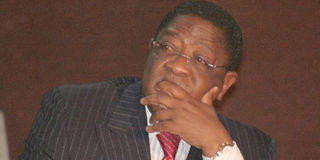Waki report lacks enough evidence, says AG

Attorney General Amos Wako. He says that the Waki commission’s evidence forms a basis for further investigations. Photo/FILE
The Waki report lacks sufficient evidence to try suspects both locally and internationally, Attorney-General Amos Wako said on Friday.
“The Evidence the commission has gathered so far is not, in our assessment, sufficient to meet the threshold of proof required for criminal matters in this country,” Mr Wako said while closing the 9th International Conference on National Human Rights Institutions at Nairobi’s Hilton Hotel.
According to Kenyan law, a case must be proven “beyond reasonable doubt” for before a suspect can be convicted.
Mr Wako told the 250 participants that the Waki report states that its evidence “may even fall short of the proof for international crimes against humanity.”
According to him, the commission’s evidence forms a basis for further investigations.
The AG could not however state how the further investigations would be carried out, only stating that the Cabinet would debate the issue “and make appropriate decisions” on the implementation of the Waki Report.
Mr Wako, who was recently challenged by Nairobi Metropolitan Development minister Mutula Kilonzo to help interpret the Waki report, said the law will be followed if the report is accepted by Cabinet and adopted by Parliament.
“The debate should go on. People should read the report for themselves and make decision on the report,” he said.
He said human rights should be part of Kenyans culture and “culture part of the national ethic engrained in the hearts and minds of people.”
The AG also said an implementation plan for the Kriegler Report on the disputed presidential elections was “being considered.”
Recommendations
The Cabinet has since agreed to implement the Kriegler recommendations which include among other things a total overhaul of the Electoral Commission of Kenya.
On the review process, Mr Wako said the Constitution of Kenya (Amendment) Bill 2008, the Constitution of Kenya Review Bill 2008 and the Truth Justice and Reconciliation Bill should be enacted before the end of the year.
The two Bills on constitutional review are meant to restart the process which failed after Kenyans rejected a draft constitution during the 2005 referendum.
Mr Wako was optimistic that Kenyans could have the new constitution by October next year. However, while signing the National Accord on February 28, both President Kibaki and Prime Minister Raila Odinga said that the country would have a new constitution by April next year.
Meanwhile, an anti-corruption watchdog has warned that the country risks plunging into anarchy if the Waki Commission recommendations are not fully implemented.
Transparency International (Kenya) executive director Job Ogonda said that although the report “might inflame passions due to certain recommendations,” justice had to be done.
“Innocent people are still living in camps under squalid conditions,” he said.
The head of the Anglican Church of Kenya, Eldoret diocese, Bishop Thomas Kogo also called for speedy implementation of the recommendations.
He said failure to do so would raise tensions and anxiety, resulting in fresh violence. British High Commissioner Rob Macaire also joined the debate, saying it was up to the Government to implement the recommendations without being influenced by outside forces.
He said the Waki commission had come up with a comprehensive report which should be taken seriously. He said Britain was watching keenly to see how the report would be dealt with.
Mr Macaire also said Britain would consider a request for assistance.
“I have talked to Kenyans and they feel that the recommendations should be implemented fully,” he said after opening a Sh650,000 foot bridge built by British Army Engineers in Kirinyaga District.
Meanwhile, Public Works assistant minister Dick Wathika has dismissed claims that implementing the recommendations will cause anxiety. He said Kenyans wanted the recommendations implemented to the letter.
“I don’t know why some leaders are becoming jittery yet the commission acted within its mandate,” Mr Wathika said.
Reported by Kipchumba Some, George Munene and Muchiri Gitonga




